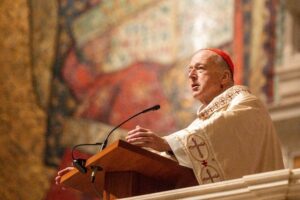The second principle of Catholic social justice promotes the importance of family and community. Likewise, the principle recognizes that individuals have a right and a duty to participate in both. Because human beings are social by nature and realize their full humanity in their interactions with others, to exclude people from the possibility of meaningful sexual relationships and the creation of family life or to alienate individuals from the possibility of full engagement with others in the building of meaningful communities is to rob them of their right to become fully human. This is the full import of the second principle of Catholic social justice.
A central pastoral and theological tension, however, exists at this time when one views the Catholic Church’s understanding of family and community in relation to present-day understandings of how families are formed and who gets to form families. The Catholic Church, affirming its traditional doctrinal beliefs regarding marriage and family, struggles in its engagement with contemporary cultural shifts toward greater inclusion and diversity with regard to the nature of marriage and what constitutes family life. Additionally, cultural understandings of community have evolved. Where the Catholic Church teaches belonging as rooted in mutual responsibility and the common good, contemporary culture often understands community as the arena for self-expression and personal fulfillment.
Principles of Diversity, Equity, and Inclusion (DEI) encourage the realization of full humanity through personal agency and authenticity. Individuals are encouraged to pursue their dreams and define family and community according to their own understanding. While this can sometimes appear to contrast with the Catholic vision, which promotes a common good built on enduring truths about human nature and vocation, these views need not be in conflict. Both perspectives, at their best, seek to uphold the dignity of every person and to foster environments where all can flourish.
Recognizing the tension that exists between the Church’s teachings and many Catholics’ lived realities, Cardinal Robert McElroy, now the newly installed archbishop of the Washington, DC Diocese, has called for the “radical inclusion” of LGBTQ persons and others who have been marginalized by the Church (America, January 24, 2023). He suggests that, while doctrinal stances remain, the Church is called to adopt a deeply pastoral approach that embraces all in their diversity and complexity. In his view, sexual orientation and marital status need not be grounds for exclusion from the Church’s life.
Rather than relying on categories that unintentionally alienate, the Church can accompany each person as a beloved child of God. In a world marked by diverse experiences of sexuality and family life, the decisions individuals make in good conscience, guided by love and responsibility, deserve a place within the Church’s pastoral care.
A self-reflective critique by the Church regarding its stance toward people who, in genuine attempts to lead moral and compassionate lives, find themselves outside alignment with specific doctrinal norms could open new paths for mercy and inclusion. Such a posture would help the Church better fulfill its own mission: to promote life, uphold dignity, and embody Christ’s compassion.
Rather than judging those who cannot live fully in accordance with every aspect of Church teaching, the Church can recognize in the sexual relationships and marital commitments of many today a sincere endeavor to live in faithful, committed love and openness to family and community. By standing in solidarity with all who authentically seek to build lives of love and service, the Church bears witness to the Gospel. In doing so, the world is healed, the poor are provided for, and the vulnerable find safety.
In every age, the Church is called to accompany her members with the heart of Christ—welcoming, listening, and walking with all who seek to love and live in communion with others. As claimed by Pope Francis, those in their otherness from us are “sacred ground” to be reverenced and respected. Only through such accompaniment can the Church be both faithful to her teachings and “radically inclusive” of all her members.
If you would like to make a comment or ask a question, I can be contacted at dtheroux@smcvt.edu. Let’s talk.

For all press inquiries contact Elizabeth Murray, Associate Director of Communications at Saint Michael's College.







